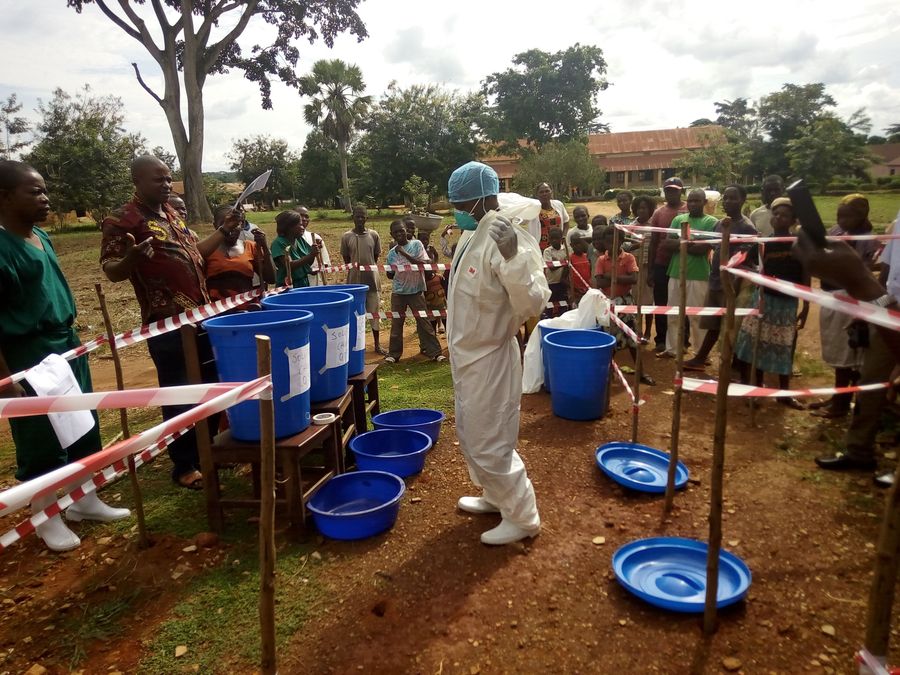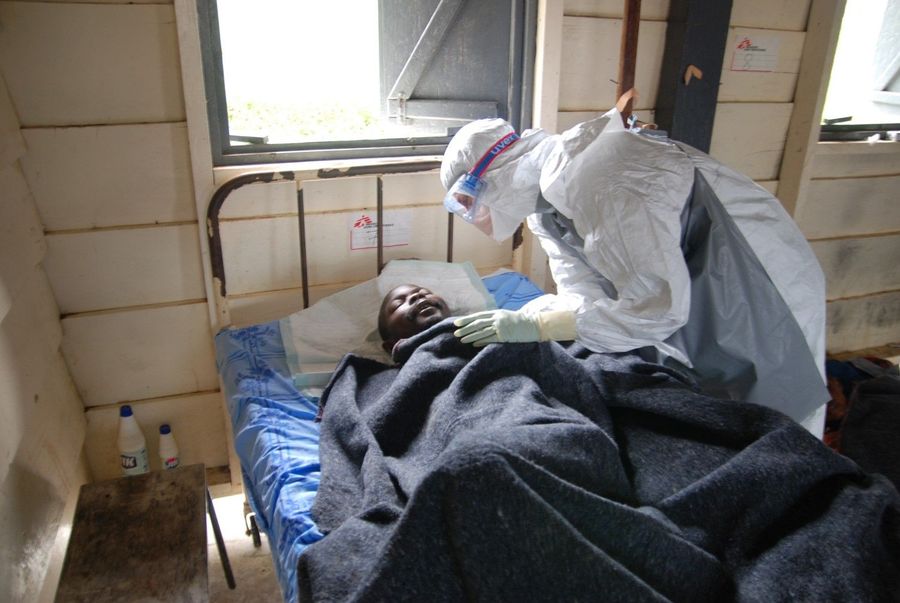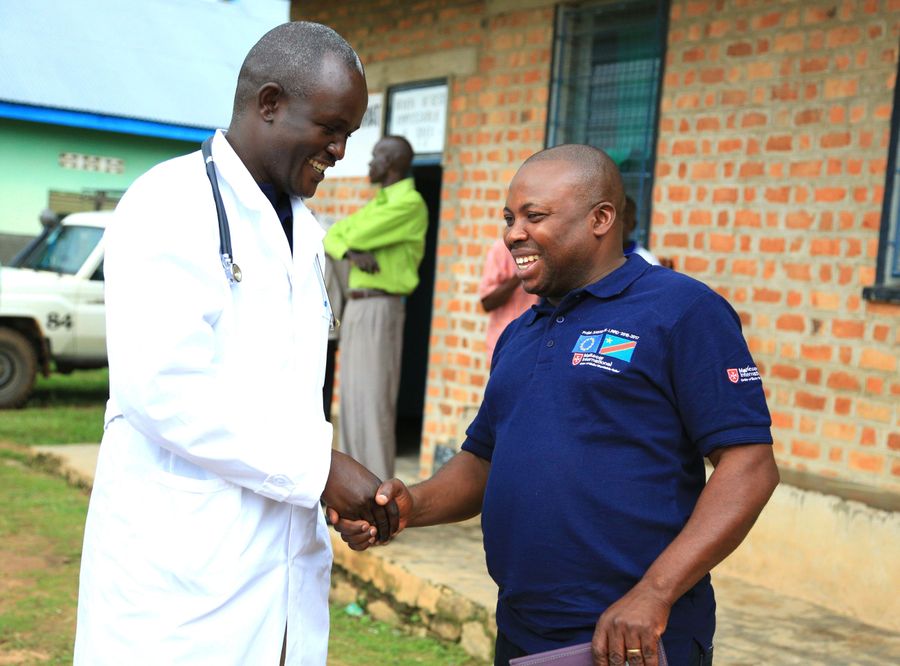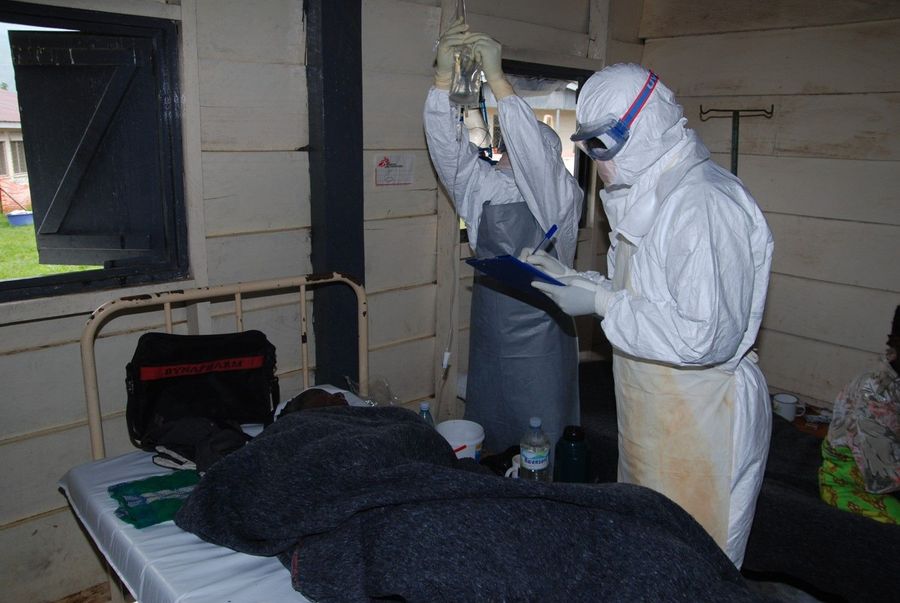Ebola in the DR Congo – A major cause of fear

A deadly Ebola outbreak in the Democratic Republic of Congo (DRC) is worsening an ongoing humanitarian crisis in a conflict-hit area of North Kivu. So far nearly 80 cases have been reported, and 44 people have lost their lives to the deadly virus. Jules Tanganika, Malteser International's Ebola expert in the north-east of the Democratic Republic of Congo, talks to us about the recent outbreak in early August and how it is affecting people’s way of life.
How would you describe the current situation for the people in the areas affected? Exactly how serious is this latest outbreak?
The present situation is extremely grave and both international and the local media are reporting on the Ebola outbreak. Everyone here is worried because there have now been several confirmed cases in our province Ituri. A very deadly form of the virus, the Zaire strain was confirmed in Beni health zone. The people are understandably scared because fifty per cent of Ebola cases end fatally. The virus is highly contagious. Everyone who has come in contact with an infected person must be screened and closely monitored until incubation is over.
Why is Ebola a recurring disease in the DRC?
There are several factors: Many bats carry the virus and infect wild animals. Here these wild animals are consumed as popular sources of protein and the public awareness of a possible risk of infection is still low. There is also poor hygiene and inadequate hand washing facilities in public places such as bus stops, market places, churches, schools, universities or hospitals. Because many healthcare facilities are also in poor sanitary conditions, the virus can spread more quickly. The main regions affected are very poor regions, where people are still suffering from the consequences of armed conflict. There is hardly any infrastructure, the roads are bad and towns are difficult to access.

Photo: Jules Tanganika/Malteser International
What are the implications of the Ebola outbreak for those affected and for society in the DRC?
Naturally, the most devastating aspect for many people is the loss of dear ones. Many families that have been affected have had to face stigma, and are often ostracized in their communities. Ebola is a major cause of fear and there is a certain paranoia in society, but even in healthcare circles.
The disease is changing the way of life here. Shaking hands is a normal form of greeting but nowadays people are careful whose hands they shake. Many have been forced to break away from traditions. For example, it is customary to touch the body of a deceased relative during funeral, but now only trained health personnel with protective clothing can do this. To prevent further infection, people would also have to change the way they nourish themselves.
Apart from the Ebola virus. What other issues are the most pressing at the moment for the people?
People are concerned about some political issues that relate to their safety, but the Ebola is really a big issue at the moment. As said earlier, this is the tenth outbreak in the country. The people have been made aware of the deadliness of the virus and many people are adhering to vital information on how to stay healthy.
How do doctors and other experts assess the medium-term threat of this outbreak?
We have high hopes that the epidemic will not be so bad this time and that it will only last a few weeks or months. We have learned a great deal from the experiences of past outbreaks and we believe that training and raising public awareness is key to fighting Ebola. Malteser International, for example, has been active in this area by integrating prevention measures into its health project activities in recent years. These include hand hygiene, avoiding injuries from needles and other sharp instruments, adequate disinfection of medical equipment such as stethoscopes or thermometers, but also greater caution in waste management.

Do you think there is a risk of the Ebola virus spreading to neighboring countries like Uganda?
Not all border crossings between Uganda and the DRC are effectively controlled. Therefore, there is a possibility of the virus spreading beyond the border. Border controls like checking the temperature of travelers, hand washing should be intensified.
What is Malteser International doing to help?
Malteser International has set up an emergency management committee for epidemics in cooperation with the Ariwara health zone. We have also trained health professionals and increased public awareness on wild game and bat meat. This meat should not be consumed. Additionally, we are sensitizing people on various hygiene issues like regular handwashing with chlorinated water or alcohol. We have advised against shaking hands during the epidemic and touching the body of deceased Ebola patients. There are plans to set up additional hand washing stations in various public places.
In addition, Malteser International is working on providing personal protective equipment in seven health zones. A mobile isolation unit will be set up in our project areas. This unit will have a division for suspected Ebola cases, confirmed cases, and cured patients as well as a tent for our medical staff. The isolation unit will soon be operational.

So what do people on the ground need most?
Health centers need more funding to strengthen their preventive efforts. At the moment, the necessary funds are not available. More medical material, protective equipment and more hand washing stations are needed. Volunteers are very important for educating the population: vital information must be passed on in to churches, schools and in all communities. There are many volunteers in the communities, but they too need training and financial support to pay for their travel and food.
Jules Tanganika has been working for Malteser International in the Democratic Republic of Congo for close to 13 years. The 50-year-old is Peripheral Technical Assistant (ATP) in our Ariwara office and is responsible for the technical support of health centers in the Aba health zone, northeast of the DRC. Besides providing technical advice to the centers, he is also responsible for the logistical and financial management of health centers in the zone. He trains students and hospital personnel in prevention issues and carries out evaluating Malteser International’s health programs in the region.
Malteser International has been present in the DR Congo since 1996, supporting regional health institutions to prevent and tackle epidemics through the training of healthcare workers in hospitals, health centers and administrative offices. We also work to improve access to clean water and hygiene conditions in health facilities. Our work in DR Congo spans three provinces across nine health zones in the northern and northeastern part of the country. A health zone corresponds to what can be referred to as a health district, comprising about 15 primary healthcare centers and headed by a district hospital. These centers cater to the health needs of around 8,000 to 100,000 residents.
(August 16, 2018, Johanna Osswald)








